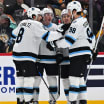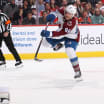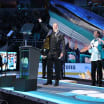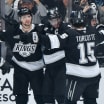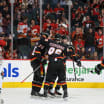MONTREAL --The NHL events team huddled in a makeshift office in a quiet Bell Centre on Saturday, the first of back-to-back "off" days in the Stanley Cup Final. At one point, a TV screen displayed a blueprint of the arena, including the locations of the carpets to be laid on the ice for a championship ceremony. At another point, a laptop screen showed the forecasted track of Tropical Storm Elsa over Florida.
NHL events staff navigating challenges in Cup Final
Adhering to COVID-19 protocols, preparing for tropical storm as series reaches clinching scenario

One of two things will happen after Game 4 here Monday (8 p.m. ET; NBC, CBC, SN, TVAS): If the Tampa Bay Lightning win, the NHL will award the Cup while adhering to strict COVID-19 protocols. If the Montreal Canadiens win, the NHL will put the Cup on a charter plane to Tampa with more than 100 people while avoiding the storm. Game 5 will be there Wednesday, rain or shine.
Whatever happens, whatever the challenges, the NHL must respect tradition, put on a show and keep everyone safe.
"You're just always in the mindset, 'It's either this, or it's this,'" NHL chief content officer Steve Mayer said on a bus back to the hotel. "One of the things that you just worked on is not going to happen, and the other thing is going to happen. You just know that's just the nature of the beast. We're living in a sport that's completely unpredictable, and we go with the flow. I think that's part of the fun of it as well."
Each clinching scenario in the Cup Final takes meticulous planning in normal times, because the NHL events staff has to account for each arena's quirks. The COVID-19 protocols add extra layers this year.
If the Lightning win the Cup on Monday, there will be no pyrotechnics when captain Steven Stamkos raises it, as there were when St. Louis Blues captain Alex Pietrangelo raised it in 2019, creating an iconic photo. That would have required equipment on the ice, and that would have required more people cleared to set up, test and operate it.
There will be another special effect, though.
"We're working on solutions that don't involve ice access," NHL executive vice president of events Dean Matsuzaki said.
There will be no media, families or friends on the ice, either, only rightsholders.
Masked and physically distanced during the meeting Saturday, the NHL events staff went over all kinds of details: How will interviews be conducted and where? Where should the team picture take place? Should the carpets be here or there? What about camera angles? Cords? Water?
Seriously. Even water isn't simple. Normally, the NHL brings fresh water and Gatorade to the visitors' bench for the players during the celebration, because obviously they need to hydrate having just played a hockey game. But at Bell Centre, the only access to the visitors' bench is from the ice.
"I was thinking, 'How are we going to do that?'" Matsuzaki said. "We're going to have to figure out how to get some out from the locker room."
COVID-19 protocols are a main reason the NHL is using a charter plane to transport essential personnel and rightsholders. Under the national interest exemption Canada granted the NHL allowing cross-border travel with a modified quarantine, everyone going back and forth must stay in a moving bubble in both Tampa and Montreal.
If the Canadiens extend the series Monday, everyone has to get to Tampa on Tuesday, not just to prepare for Game 5 itself, but to plan for the aftermath. One of two things will happen then: If the Lightning win, the NHL will award the Cup, only at Amalie Arena instead of Bell Centre. If the Canadiens extend the series again, the NHL will pack up and head back to Montreal.
"Some people need to get certain places earlier than others," Mayer said. "Everybody knows that, 'I might have to do something that's a little inconvenient for me, but it's because that person over there has to do their job. They have to be back.' That's what I think is kind of cool about this, too. As a team, we can just say, 'You know what? It is what it is, and we get it.'
"But the unpredictability of it all is always the most interesting piece, and it keeps you on your toes."
Especially when there is, you know, a tropical storm.
Mayer and Matsuzaki sat at a desk and discussed scenarios with travel planners over Zoom, then consulted Earth Networks, a weather service with which the NHL has a contract, usually for outdoor games. Elsa was a hurricane Friday. It weakened to a tropical storm Saturday, but much was uncertain.
When should the charter plane leave? Right after Game 4? What if the game goes to overtime or multiple OTs? Early in the morning Tuesday, and if so, how early? Again, even a charter flight isn't simple. It requires crews not just in the air but on the ground in both cities, plus customs.
"The Stanley Cup Final's always a crazy time, but this definitely adds to it," Matsuzaki said.
Mayer and Matsuzaki were told the brunt of the storm likely would hit Tampa from Tuesday evening through Wednesday morning, so they decided to leave early Tuesday morning.
But then Mayer thought of something.
What about food? Because of COVID-19 protocols, no one in the traveling party can leave the hotel in Tampa. Ordering delivery might be difficult, if not impossible, in the middle of the storm. Another problem to solve.
All in an "off" day's work.
"We spend our days off preparing for what could come up," Mayer said with a laugh. "You just never know. Hurricanes? Like, are you kidding me? But you just say, 'Hey, [these are] the cards that we're dealt, and let's just make some good decisions.'"









